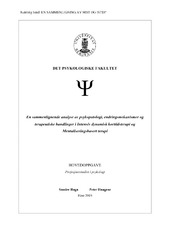| dc.contributor.author | Haga, Sondre | |
| dc.contributor.author | Haugene, Peter | |
| dc.date.accessioned | 2020-01-23T03:47:51Z | |
| dc.date.available | 2020-01-23T03:47:51Z | |
| dc.date.issued | 2019 | |
| dc.date.submitted | 2020-01-22T23:00:15Z | |
| dc.identifier.uri | https://hdl.handle.net/1956/21334 | |
| dc.description.abstract | Vi har i denne oppgaven sammenlignet teorier om psykopatologi, endringsmekanismer og terapeutiske handlinger i de psykoterapeutiske behandlingsmetodene Mentaliseringsbasert terapi (MBT) og Intensiv dynamisk korttidsterapi (en. ISTDP), med særlig vekt på endringsmekanismer. Modellene deler en felles psykoanalytisk arv, men vi har i denne sammenligningen funnet det vi mener er vesentlige forskjeller i teori. Ontologiske forskjeller viser seg ved at ISTDP i større grad tar et strukturalistisk standpunkt i sin forståelse av psykopatologi og endringsmekanismer, mens MBT i større grad fremstår funksjonalistisk. Metodene synes å være ulikt orientert i sin forståelse av pasienten og den terapeutiske prosessen som henholdsvis et lukket intrapersonlig system (ISTDP) eller gjensidig, interpersonlig system (MBT). Erfaringer med tidlige signifikante personer i utviklingen av psykopatologi vektlegges i begge modellene, og metodene synes å enes i sitt syn på psykopatologi som å ha opphav i noe som ikke er tilstrekkelig integrert i pasientens selv. Vi finner imidlertid at de respektive terapeutene virker å arbeide på forskjellige måter med tilsynelatende ulikt psykisk materiale. ISTDP-terapeuten benytter seg av spesifikke teknikker mot fortrengte konfliktfylte følelser, mens MBT-terapeuten tar i bruk generelle prinsipper for å øke evnen til mentalisering av umentalisert affekt. | en_US |
| dc.description.abstract | We have conducted a theoretical comparison of contemporary theories of psychopathology, mechanisms of change and therapeutic action in the psychotherapeutic treatments Mentalization-based treatment (MBT) and Intensive Short-Term Psychodynamic Therapy (ISTDP), with emphasis on mechanisms of change. The models share a psychoanalytic inheritance; however, our comparison reveals considerable differences in theory. Ontologically, ISTDP adhere to a structural point of view of psychopathology and mechanisms of change, while MBT take a more functionalist viewpoint. In their understanding of the patient and the therapeutic process, the methods present rather different orientations; respectively as a closed intrapersonal system (ISTDP), and a reciprocal interpersonal system (MBT). The importance of experiences with significant others in early childhood is shared and inherent in their theories, and the models appear to agree in their view of psychopathology being rooted in something not sufficiently integrated in the patient's self. Nonetheless we find that the respective psychotherapists work not only differently, but also with different psychic material. The ISTDP-therapist works with specific techniques targeting repressed and conflicting feelings, while the MBT-therapist work according to general principles to increase the capacity to mentalize the unmentalized affect. | en_US |
| dc.language.iso | nob | |
| dc.publisher | The University of Bergen | |
| dc.rights | Copyright the Author. All rights reserved | |
| dc.subject | Intensive Short-term Dynamic Psychotherapy | |
| dc.subject | Mentalization-based therapy | |
| dc.subject | therapeutic action. | |
| dc.subject | theory of psychopathology | |
| dc.subject | mechanisms of change | |
| dc.title | En sammenlignende analyse av psykopatologi, endringsmekanismer og terapeutiske handlinger i Intensiv dynamisk korttidsterapi og Mentaliseringsbasert terapi | |
| dc.title.alternative | A comparative analysis of psychopathology, mechanisms of change and therapeutic action in Intensive Short-term Dynamic Psychotherapy and Mentalization-based therapy | |
| dc.type | Master thesis | |
| dc.date.updated | 2020-01-22T23:00:15Z | |
| dc.rights.holder | Copyright the Author. All rights reserved | |
| dc.description.degree | Hovedoppgave psykologprogrammet | |
| dc.description.localcode | PROPSY317 | |
| dc.description.localcode | PRPSYK | |
| dc.subject.nus | 736102 | |
| fs.subjectcode | PROPSY317 | |
| fs.unitcode | 17-0-0 | |
